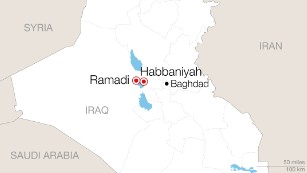For months, her mother Nada Saleh had used the tablets as her only way of getting rest amid incessant air strikes and battles between ISIS forces in her hometown of Ramadi and those that would want to liberate the Iraqi city.
But when the time came to run, Saleh decided to feed them to her children, including her young daughter, to calm their panic and stop their anguished cries alerting the militants.
“I had some sleeping pills remaining that I gave to them so they wouldn’t cry and give our hiding place away,” she says.
Saleh and her husband had spent months trying to survive under ISIS’ radar, but the family decided it was time to get out when sword-wielding men came calling, and set fire to their home
“As they burnt my house, they pulled us out and threatened my husband with a sword to his neck,” she told CNN.
Saleh feared that she, her husband and six children would be used as human shields in the face of Iraqi forces’ assault on the city.
“They wanted [my husband] to move us to the Suffiya district where they’ve pushed other families.
“ISIS are hiding behind the families there, using them to hide from the Iraqi forces. If it wasn’t for my husband, we would still be in there, that could be us.”
Saleh’s husband managed to escape from ISIS but like many of the men who have fled Ramadi, he is now being questioned by Iraqi authorities to establish whether he had any link to the militants.
The mother-of-six says the moment the family held hands and walked across the front line returns to haunt her whenever she closes her eyes.
“I took off my daughter’s white headscarf and waved it as we walked. I kept shouting, ‘We’re not a threat.’
“In that moment, I thought, ‘We’re going to die.’ I said the Shahada [the Islamic creed, and the prayer of the dying] as we walked.
“I thought ‘We’re walking towards death, or we’re walking towards life,’ but either way I had to take the risk.
“For four days we hid, moving from place to place,” she recalls. “Last night we slept in a bombed out building. The kids were shivering but we couldn’t dare light a fire.”
Eventually, they made it to Habbaniyah, to a displaced persons camp built to house those lucky enough to make it out of ISIS-held territory.
Constructed on the site of a “tourist village,” many of the tents at Habbaniya still stand empty; the families they were meant to hold are still trapped inside the city, 25 miles to the west.
Iraqi forces, backed by Western air power, drove ISIS fighters out of the heart of Ramadi last week, but militants still control parts of the city’s eastern districts.
Iraq says some 1,000 families remain in eastern Ramadi; the government believes they are being used to protect the militants.
While she waits to hear from her husband, Saleh and their children — still shaking from their ordeal — can do little but relive their traumatic escape, and worry about what the future holds.
“How many times, do you think it is possible to die?” she asks. “Even now, hearing a car drive past, I jump. I think, ‘This is it.’ We still live with that fear.”
As reported by CNN

